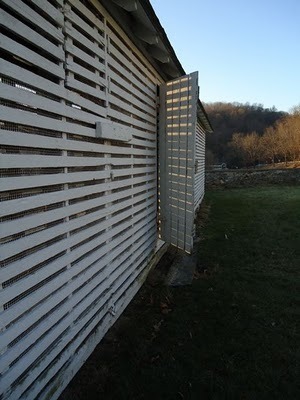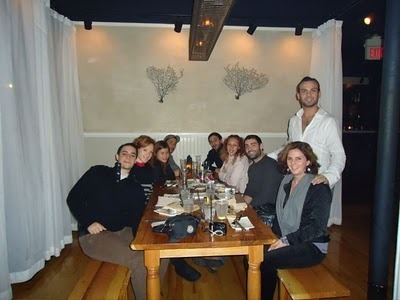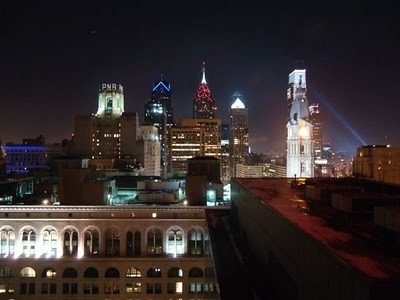Beth Kephart's Blog, page 260
February 6, 2011
Working on Beginnings
 This week my utterly tremendous Creative Nonfiction students at Penn will be sharing their latest work, talking Ginzburg and Gornick, and reflecting on beginnings. What do beginnings (in memoir) do? What are the options? What has been done that works, what has been done too much, what are the remaining untested possibilities (are there any)?
This week my utterly tremendous Creative Nonfiction students at Penn will be sharing their latest work, talking Ginzburg and Gornick, and reflecting on beginnings. What do beginnings (in memoir) do? What are the options? What has been done that works, what has been done too much, what are the remaining untested possibilities (are there any)?I've been compiling my read-aloud excerpts for the week. Here's what we've got on the list:
* Running in the Family (Michael Ondaatje)
* Hiroshima in the Morning (Rahna Reiko Rizzuto)
* Let's Take the Long Way Home (Gail Caldwell)
* The Music Room (William Fiennes)
* Lit (Mary Karr)
* No Heroes (Chris Offutt)
* Truth and Beauty (Ann Patchett)
* Limbo (A. Manette Ansay)
* Four Seasons in Rome (Anthony Doerr)
* The Names of Things (Susan Brind Morrow)
* The Tongue Set Free (Elias Canetti)
* The Memory Palace (Mira Bartok)
* Breaking Night (Liz Murray)
* Cakewalk (Kate Moses)
* Seeing Through Places (Mary Gordon)
One feels compelled (impelled) to share every last something one knows or feels with kids like these. I study my bookshelves, seeking more.




Published on February 06, 2011 15:21
A Book Complete
 Yesterday this was a book in need of a thorough editing, and of eight missing pages. Today it is a book complete, a novel for adults, a story that has ached through me and commanded attention, despite (as always) all else. I didn't second guess the book's shape this time. I didn't find gaps or a trail of inconsistencies. I didn't want to rewrite, when I studied it close. I wanted it to be.
Yesterday this was a book in need of a thorough editing, and of eight missing pages. Today it is a book complete, a novel for adults, a story that has ached through me and commanded attention, despite (as always) all else. I didn't second guess the book's shape this time. I didn't find gaps or a trail of inconsistencies. I didn't want to rewrite, when I studied it close. I wanted it to be.I am in a chase now, behind all manner of other deadlines. I will take a walk and then go about the fair and proper business of reckoning with all standing obligations.
Thank you, all, for putting up with me while I fought to bring this story to the page. I am always painfully aware of my own absence.




Published on February 06, 2011 08:15
February 5, 2011
The Memory Palace/Mira Bartok: Reflections
 I have been reading Mira Bartok's The Memory Palace these last several days, slowly taking in the story this daughter (for Bartok is mostly, in his memoir, a daughter) records about her brilliant, beautiful, mentally ill mother. It is a survival story, first and foremost—a deeply loving, never condemning return to a life spent looking for safety during a mother's unruly outbursts. This mother and her two daughters are poor to begin with; Mira's father abandons the family early on. But true poverty sinks in as their mother quickly loses her power to work and her ability to provide. The quiet days are the days when their mother is institutionalized. The terrifying days are the ones in which the mother leaves the girls stranded in places both foreign and familiar, or bangs on the other side of a door, demanding to know if the girls are whores. There is a grandmother nearby, but she has troubles of her own. There are neighbors and the occasional piano teacher or kind adult who step in, offering only temporary reprieves.
I have been reading Mira Bartok's The Memory Palace these last several days, slowly taking in the story this daughter (for Bartok is mostly, in his memoir, a daughter) records about her brilliant, beautiful, mentally ill mother. It is a survival story, first and foremost—a deeply loving, never condemning return to a life spent looking for safety during a mother's unruly outbursts. This mother and her two daughters are poor to begin with; Mira's father abandons the family early on. But true poverty sinks in as their mother quickly loses her power to work and her ability to provide. The quiet days are the days when their mother is institutionalized. The terrifying days are the ones in which the mother leaves the girls stranded in places both foreign and familiar, or bangs on the other side of a door, demanding to know if the girls are whores. There is a grandmother nearby, but she has troubles of her own. There are neighbors and the occasional piano teacher or kind adult who step in, offering only temporary reprieves.The specter of this mother (a former musician headed to Carnegie Hall) will haunt her daughters through high school and college, through early romances and careers. Only after every possible intervention fails, Mira (who was born Myra) and her sister change their names and elude their mother—a tactic that might provide some order, certainly, but does not relieve either daughter from worrying over their schizophrenic, increasingly homeless mother.
Bartok began life as an artist, and her complex, quite lovely illustrations sit at every chapter's start, alongside notes from the mother's own heartbreaking journals, discovered by Mira and her sister in a storage unit during the mother's final few weeks of life. The journal entries betray a woman struggling to hold on—to anchor in with some kind of knowledge, any kind of knowledge, any thing she can note, decipher, track. The journals also provide a haunting counterpoint to Mira's own struggle to remember and understand, for Mira herself has suffered a brain injury in the intervening years, thanks to a terrible car accident.
Bartok, who is also a children's author, fills her story with allusions to myths and fantasy, softening the insufferable with flights of tremendously fancy. She writes at times quite simply and at times with a poet's stance. She blames no one, but always tries to understand. I admired her work enormously here—her empathy, her powers of recall—and if at times I felt that some of the tangents added unnecessarily to the story, or took the tale as a whole more toward autobiography than memoir, I closed the book with the deepest respect for Bartok, not just as a writer, but as a person.




Published on February 05, 2011 10:00
February 4, 2011
My father loves a good sausage sandwich, I told the man,
 and so he helped me choose the right mustard and the right horseradish for inclusion in my father's birthday bag. Condiments from Lancaster County. Italian cookies from Termini Brothers. A Penn cap for the Penn scholar. A Penn pen to finish things off while seated at our new favorite restaurant in Berwyn. My mother was the best gift buyer in the whole wide world, and no one could ever fill her shoes, and besides, aren't early February birthdays hard, coming so soon after Christmas?
and so he helped me choose the right mustard and the right horseradish for inclusion in my father's birthday bag. Condiments from Lancaster County. Italian cookies from Termini Brothers. A Penn cap for the Penn scholar. A Penn pen to finish things off while seated at our new favorite restaurant in Berwyn. My mother was the best gift buyer in the whole wide world, and no one could ever fill her shoes, and besides, aren't early February birthdays hard, coming so soon after Christmas?Still, I wanted my father's big day to be special, and so I asked the condiments man if I might snap a photo to show my dad just where his two new bright jars had come from. I didn't get a picture of jars alone. I got the man himself. In action.




Published on February 04, 2011 06:19
February 3, 2011
Truth or Fiction: Does it Matter When the Lines Get Blurred?
 It may be entirely fuddy duddyish of me, but I continue to ponder the matter of truth on the page—the need, as I see it, to get as close as possible to the what-actually-was when endeavoring in the minefields of memoir or literary nonfiction. Yes, it is true: What we remember shifts and slides during the very act of remembering. Yes, it is also true, as Ander Monson writes in "Voir Dire," that, "The unreliability, the misrememberings, the act of telling in starts and stops, the ****ups, the pockmarked surface of the I: that's where all the good stuff is, the fair and foul, that which is rent, that which is whole, that which engages the whole reader. Let us linger there, not rush past it." The only interesting life, on the page, is the shaped life, the contemplated one, the one sifted for meaning and insight. But don't we have an obligation, nonetheless, to get it all as right as we can get it—to not deliberately work beyond the ken of what we believe happened?
It may be entirely fuddy duddyish of me, but I continue to ponder the matter of truth on the page—the need, as I see it, to get as close as possible to the what-actually-was when endeavoring in the minefields of memoir or literary nonfiction. Yes, it is true: What we remember shifts and slides during the very act of remembering. Yes, it is also true, as Ander Monson writes in "Voir Dire," that, "The unreliability, the misrememberings, the act of telling in starts and stops, the ****ups, the pockmarked surface of the I: that's where all the good stuff is, the fair and foul, that which is rent, that which is whole, that which engages the whole reader. Let us linger there, not rush past it." The only interesting life, on the page, is the shaped life, the contemplated one, the one sifted for meaning and insight. But don't we have an obligation, nonetheless, to get it all as right as we can get it—to not deliberately work beyond the ken of what we believe happened?Having been deeply moved by "The Wave," Francisco Goldman's Personal History story in this week's issue of The New Yorker, I went on to find this audio recording of an interview conducted with Goldman in The New Yorker offices. Goldman is talking about both the essay and the novel, Say Her Name, that Grove is releasing this April. Both pieces—the essay and the fiction—were inspired by the tragic death of Goldman's young wife. Just why Goldman chose to call the long work a novel and the short piece an essay is hugely instructive, and, I think, honors both his wife and the respective forms. You can find his commentary specific to that matter starting nearly 7:45 minutes into the conversation.




Published on February 03, 2011 05:17
February 2, 2011
I'm not typically known for my asphalt shots, but hey:
Published on February 02, 2011 14:17
Seriously Iced In
Published on February 02, 2011 04:43
February 1, 2011
Sunrise over Philadelphia

My only thought yesterday was of the beguiling, deceptive charm of writing and music.— Norma Herr, as quoted by her daughter Mira Bartok, in the remarkable memoir The Memory Palace, about which you will soon be reading more here. For now, I hurry to the Penn campus, to share these words and others with my students




Published on February 01, 2011 06:16
January 31, 2011
Pulling back the curtains on my city
 City Hall, the mayor's home, as viewed from the 22nd floor of the former PSFS Building, now the Loews Philadelphia Hotel.
City Hall, the mayor's home, as viewed from the 22nd floor of the former PSFS Building, now the Loews Philadelphia Hotel.



Published on January 31, 2011 14:18
In which I go on the perfect date with my husband


 This year my husband surprised me at Christmas with plans he'd made for an entire evening out. Philadelphia would be our destination—an upper room with views in the impeccable Loews Philadelphia Hotel, located in the former PSFS building; a matinee showing of Tango Fire; and a dinner at Amada, the Jose Garces (you might have seen him on the TV show, Iron Chef) tapas restaurant. A night like this would be special by any accounting; it was and is especially wonderful for me—an evening like no other in my married life.
This year my husband surprised me at Christmas with plans he'd made for an entire evening out. Philadelphia would be our destination—an upper room with views in the impeccable Loews Philadelphia Hotel, located in the former PSFS building; a matinee showing of Tango Fire; and a dinner at Amada, the Jose Garces (you might have seen him on the TV show, Iron Chef) tapas restaurant. A night like this would be special by any accounting; it was and is especially wonderful for me—an evening like no other in my married life.I love Philadelphia; you know that I do. I loved our lunch at the Reading Terminal Market before the show, loved walking, in anticipation, up Broad Street, loved stepping inside the melting pot that Philadelphia has always been—so many different voices and languages in the sold-out audience of the Merriam Theater. And of course, I love tango—fell at once for the passion and talent and acrobatics and commitment of the Fire dancers—and tapas are my favorite meal at any time; no one does them better than Jose Garces.
But if you look here, at these photos, you will find, between a picture from the Reading Market lunch and the view outside our hotel window, that something utterly unexpected happened during this already perfect afternoon and evening; the dancers from Tango Fire had come as well to Amada. I had my little camera with me. They acquiesced to a photograph. So that there I am, happier than I can say, among the things and places and man I love.




Published on January 31, 2011 07:44









